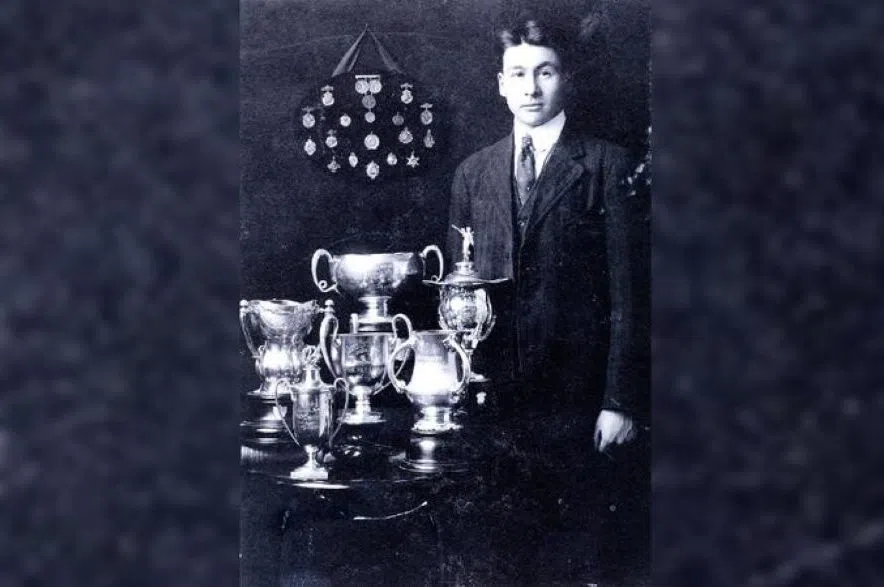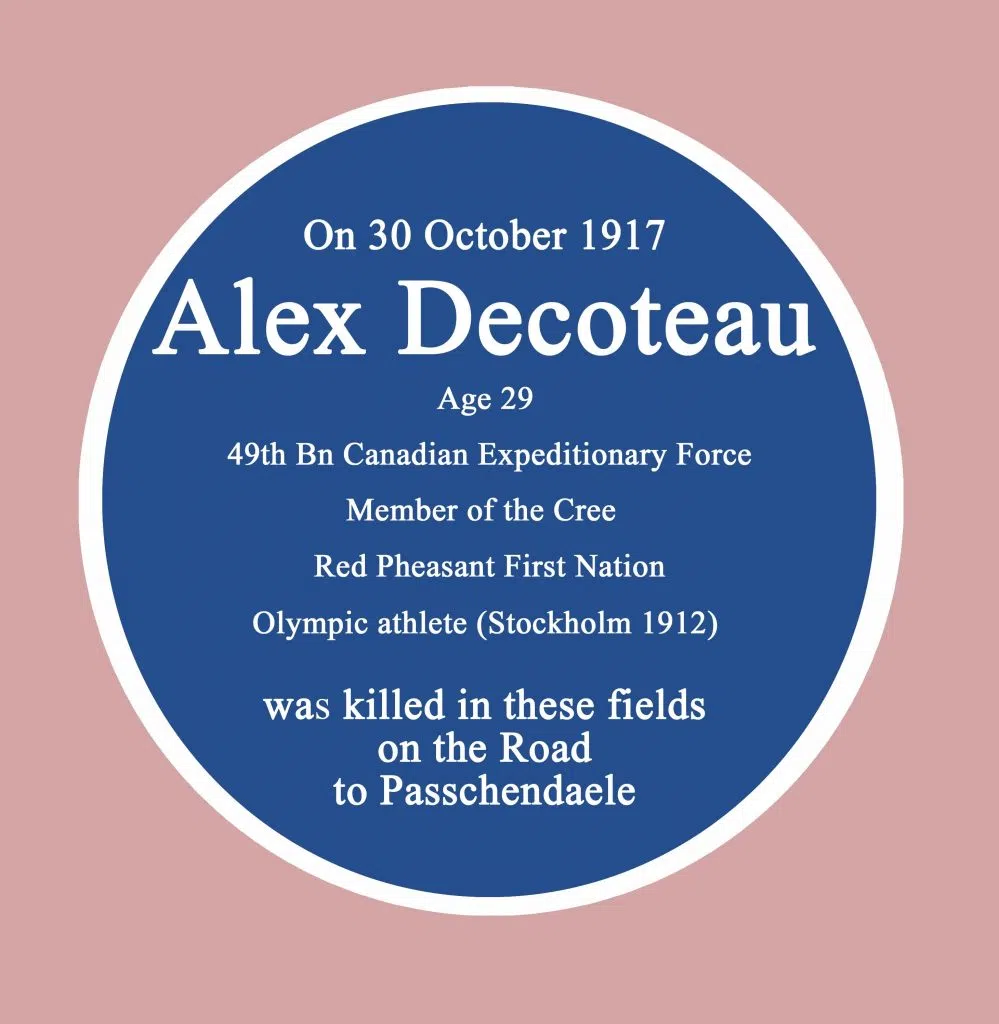By Julia Lovett-Squires
On an autumn day at the end of October 1917, a soldier fell near Passchendaele Ridge.
Now, 107 years after a sniper’s bullet struck him down, Alexander Wuttunee Decoteau of the Red Pheasant Cree Nation will be commemorated with a blue plaque in Flanders.
“We don’t know where exactly he was killed but we knew it within a few hundred metres,” said Erwin Ureel, committee member with the Passchendaele Society 1917 that spearheaded the project.
He explained that the blue plaque, which the committee is now working on to be officially unveiled on Indigenous Veterans’ Day on Nov. 8, will stand along the road near the community that was the scene of one of Canada’s bloodiest battles of the First World War.
As people come to visit the battlefield, Ureel hopes that they look upon the plaque and will want to learn more.
“(They) will first of all learn a bit about Alex Decoteau but as important for me is that it will draw the attention to the visitors that there were Indigenous people fighting in the area as well,” he said.
Remembering their sacrifice
More than 4,000 Indigenous soldiers fought in the First World War and while Decoteau is the figurehead, the plaque also serves to honour others who donned the uniform for a country that told them they didn’t belong.
Ureel said when he found out about the Indigenous service members, it surprised him as most of the Canadian contingent were descended from the British Isles.
“I thought being able to expose that to the public and because these people fought here went back – a number of them didn’t go back — it was a story which wasn’t much attention for it, and I think that’s a bit unfair because everyone who did an effort for the war effort to help free your country deserves the same recognition,” he said.
According to Paula Zadko, president of Battlefords Legion Branch 9, it’s a “great honour” to see that a soldier from a nearby community is being recognized overseas.
“This should hit home even more. We’re all fighting for the same thing,” she said.
The man behind the plaque that will bear his name achieved much in his 29 years.
Born in 1887 on Red Pheasant, Decoteau attended day school and then Battlefords Industrial School. When he moved to Alberta, he initially found work as a blacksmith before joining the Edmonton Police Service in 1909 and became the first Indigenous officer in Canada, before being promoted to sergeant five years later.
In 1912, he competed in the Olympics in the 5,000-metre race and by 1916, signed up to fight for Canada in the First World War. By the time he was sent to Belgium, he was with the 49th Battalion Canadian Expeditionary Force.
The proposed plaque will feature his name, age, unit, home community, his Olympic background, the date of his death along with the words: ‘Was killed in these fields on the road to Passchendaele.’
An education
Zadko said she doesn’t remember her grandparents ever talking about Indigenous soldiers fighting in the war so to know a local man is being recognized in such a way makes her happy.
“I see this as an opportunity to open more eyes,” she said.
The journey for the grassroots organization to get to this moment began in 2005 as Indigenous delegations went to Belgium to perform ceremonies to bring their loved ones’ spirits home.
According to Corinne MacLellan — owner of Corinne MacLellan Communications, facilitator, volunteer and honorary lieutenant colonel with the Halifax Rifles — Belgians have what she said was a “reverence for Canadian service on a level I just wish every Canadian could experience.”
MacLellan first met Ureel during the centenary period of 2014-18 when she travelled to Flanders with delegations to attend ceremonies over the four years and was witness to a particularly memorable experience when the Alex Decoteau Remembrance Run, Walk or Wheel — which Ureel began in 2007 — took place on the 100th anniversary of the battle. When she discovered the project, she wanted to get involved.
“I do a lot of work with the Assembly of First Nations and so threw out a few feelers and as soon as people got their head around, ‘Oh, OK, hang on a second. This other country wants to recognize this … incredible historical figure who has … made such a contribution on many levels,’ they were like ‘Yes,’ ” MacLellan said.
Ureel, who was awarded the Meritorious Service Medal in 2021 by the Governor General of Canada for his efforts in preserving the memories and legacy of Canadian service to his country, said the project will cost roughly €4,000.
“Even if it’s a modest project, I’m quite happy that we can do this,” Ureel said.
Zadko said before she learned about the initiative, she had never heard of Decoteau or his achievements. Knowing that a small organization in another country is in the process of creating something for a local man who died over 100 years ago is monumental.
“That’s exciting for a Legion,” she said, noting on a personal note that she’s grateful he is being recognized.
According to MacLellan, while Indigenous education in general is getting better, Indigenous military history needs to be celebrated. The people of Flanders, she said, revere names like Sam Glode and Francis Pegahmagabow and have worked to ensure the men aren’t forgotten – they were the ones who held their towns.
“They’re people who almost ascended to mythical status,” she said.
The story of what happened in the small village just east of Ypres may separate Canadians by time and space, but for the Belgians, the history is still palpable.
“They mean so much because this is in their backyard,” MacLellan said.
Local hero, athlete and officer
The project is still in the early stages. Still, the society is working to bring a delegation of Indigenous members to the unveiling and is looking to reach out to Decoteau’s family so they may be a part of the preparations and ceremony.
Back in the Battlefords, Zadko said it gives her chills to think there will be a plaque with a local man’s name on it posted near his grave in the hallowed Flanders Fields.
“That gives me goosebumps,” she said.
“For me, that is a sense of pride to know that someone so close is in Flanders like I can’t even describe it except for great pride and great thanks to his service.”








